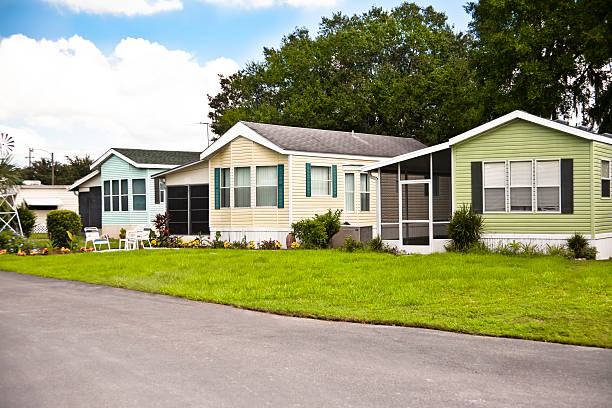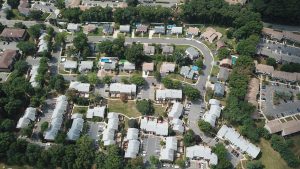More often than not, whenever the term mobile home is used, people are more likely to associate it with low quality. It is a misconception that surrounds the mobile home industry due to the quality of the homes manufactured before 1976.
If you are looking to make a living in real estate, it is ideal to choose the right property for your portfolio. Not only should you choose a real estate property with strong rental income potential, but also one that is likely to appreciate its value over time.
If given the same care as any site-built home, manufactured homes should last forever. A report by the Federal Housing Finance Agency indicated that manufactured homes retain value much like stick-built homes.
Needless to say, many real estate investors worry about the quality and lifespan of mobile homes. So the question is, how long will a mobile home last?
Let’s dive in and uncover the mystery.
How Long Do Manufactured Homes Last?
The truth is, today’s manufactured homes are built to the Federal Manufactured Home Construction and Safety Standards, better known as the HUD Code, which is administered by the U.S. Department of Housing and Urban Development (HUD). For instance, fire resistance and energy-efficiency of the home are some examples of the aspects that are regulated.

The lifespan of a mobile home is a frequently discussed topic. To settle the argument, a study by the Manufactured Housing Institute placed the average life expectancy of a manufactured home at 55.8 years.
How to give your manufactured home a longer life span
Looking to invest in manufactured homes suggests that you will want it to stay standing for a very long time. But how do you increase the chances of your manufactured home lasting long?
Here are some of the tips to consider:
Keeping up with maintenance
It goes without saying that for your manufactured home to last long, proper maintenance has to be followed to the letter.
For example, painting the home’s exterior regularly and caulking all exterior seams where water could enter will go a long way.
Unlike site-built homes, where maintenance is your full responsibility, manufactured homes in community parks are attended to by park owners, to whom you pay a lot rent, which can also help with the longevity of your home.
When agreeing on a lease, establish the part you’ll play in maintenance.
Being vigilant about water damage
It is paramount to attend to all plumbing issues, as soon as they show up, to avoid further damage. This could add more years to your manufactured home.
Also, ensure your manufactured home is properly ventilated.
Choosing the right location
Where you choose to place your home has a lot to do with weather conditions. You should consider areas with no extreme humidity, otherwise you run the risk of your manufactured home building materials, like wood, warping and degrading over time.
Why Do Some Believe that Mobile Homes Have a Short Life?
The perception that mobile homes have a shorter lifespan than other forms of housing has been making waves over the years.
This is fueled by several reasons, as detailed below:
Portrayal of Manufactured Homes in News Media
More often than not, news reports focus on manufactured homes, above all other property types, whenever harsh weather is in the forecast.
In contrast, the U.S. Department of Housing and Urban Development (HUD) and enhanced installation practices for manufactured homes have countered the notion that homes built in a factory are particularly susceptible to weather.
Emergency Response Practices
When storm damages do occur, you often see the Federal Emergency Management Agency (FEMA) sending “temporary housing” to areas where people are displaced from a variety of homes.
The housing issued by FEMA is sometimes similar to manufactured homes. However, what you probably don’t know is that this temporary housing is not the same as manufactured homes, as they are not built to the same standards.
Reasons to Be Optimistic About the Longevity of Mobile Homes
You have more than one reason to be optimistic about mobile homes.
The construction process they go through only assures the quality aspect of the home.
Take a look at the details below:
Mobile homes are designed for safety and efficiency
The primary reason the HUD code was passed by Congress in 1976 is to enhance the manufactured home safety and construction standards, which improves the living conditions for homeowners.
In fact, manufactured homes are held to a higher standard, when it comes to quality and safety, than ever before.
Unlike site-built homes, the wood and metal that go into a new manufactured home have been safely stored inside a factory. The building materials used for manufacturing the home only experience the outdoor weather once they are complete.
Stable Labor Force
Manufactured homes are built in factories by professionals. The attention to detail is what keeps the consistency and heightens the standards of a new manufactured home.
For instance, electricians and framers work in the same building, on the same line, every day.
HUD inspects manufactured homes
It’s not officially a manufactured home until HUD has attached its metal verification plate to it. This indicates that the home has met the manufactured home construction and safety standards set forth by the U.S. Department of Housing and Urban Development (HUD).
Prior to construction beginning at the factory, several in-house inspections and quality assurances are conducted, as per the federal building code.
In fact, manufactured homes are one of the most heavily inspected forms of housing there is.
Factors That Negatively Impact a Manufactured Home’s Lifespan
The inspection and quality assurance that is done in the factory aren’t the only reasons for the long lifespan of your home. There are more cards at play here:
Improper Installation
Without a doubt, if your mobile home was not properly installed, the structural integrity of the entire home will be compromised.
Over time, the effects of poor installation will keep showing, and it eventually will end up costing you more than you anticipated.
To counter the problem, it is highly advised to have your home inspected before moving in, regardless of whether it is a new manufactured home or a used one.
Foundation Problems
The poor foundation of your manufactured home can affect its lifespan. If your home experiences movement in the soil, this could weaken the framework of the house.
Furthermore, this could cause un-leveling of the home, resulting in your door not shutting properly, walls cracking, and eventually leaks occurring in plumbing.
Damage
Water is the biggest culprit, as far as damage is concerned.
Whether it is a leaking pipe or a leaking roof, water can cause extensive damage to a mobile home. On the other hand, cold weather can freeze plumbing, while hot weather can create humidity and mold problems.
Should You Remodel Your Mobile Home
Remodeling an older mobile home can be a great way to increase its lifespan.
However, the decision is dependent on several factors. For instance, remodeling a home that was made before 1976 can be costly, as they were not built to HUD code standards.
To give you an insight, many of these homes only have 60 to 100 amp electrical panels, which are inadequate for today’s electrical needs.
More often than not, the wiring and plumbing are sketchy and most have non-uniform window and door sizes.
When Should a Mobile Home Be Scrapped?
A general rule of thumb states that if a home is in a condition that the cost of repair surpasses its total value, then it might be the right time to consider scrapping.
Also if it has experienced significant damage by water, insects, mold, or rot, there’s no point in holding on to it anymore. It’s better off to consider other alternatives before it gets any worse.
In such situations, you might find it is too expensive to repair and, thus, it is advisable to just cut it into pieces and sell it for scrap.
Final Thought
As discussed earlier, manufactured homes have an average life expectancy of 55.8 years.
Manufactured housing is inexpensive, when compared to site-built homes. They are energy-efficient and offer a quality home living experience, similar to a stick-built home.
The only major differences to stick-built homes are that mobile homes are manufactured in a factory and take a considerably shorter time to build.
If you are on a budget and still thinking about buying a manufactured home, you can choose to place it in a community park and pay a lot rent.
Just remember, whether you choose to buy a new manufactured home, or a used one, it is important to get it inspected to ensure its serviceable life.




